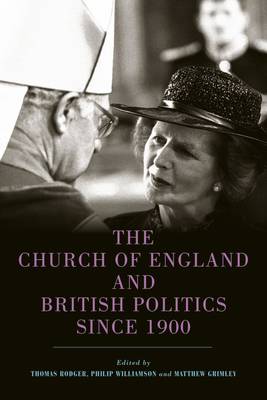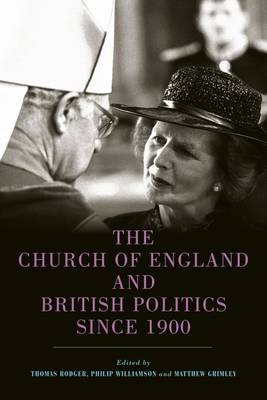
Bedankt voor het vertrouwen het afgelopen jaar! Om jou te bedanken bieden we GRATIS verzending (in België) aan op alles gedurende de hele maand januari.
- Afhalen na 1 uur in een winkel met voorraad
- In januari gratis thuislevering in België
- Ruim aanbod met 7 miljoen producten
Bedankt voor het vertrouwen het afgelopen jaar! Om jou te bedanken bieden we GRATIS verzending (in België) aan op alles gedurende de hele maand januari.
- Afhalen na 1 uur in een winkel met voorraad
- In januari gratis thuislevering in België
- Ruim aanbod met 7 miljoen producten
Zoeken
The Church of England and British Politics Since 1900
€ 209,45
+ 418 punten
Omschrijving
Bringing together researchers in modern British religious, political, intellectual and social history, this volume considers the persistence of the Church's public significance, despite its falling membership. During the twentieth century, the relationship between the Church of England and the British state was transformed. The character and dynamics of the connections shifted as politics became more democratic and society more secular, as the role of the Crown and parliament in Church government was curtailed, and as the Christian foundations of secular law were weakened. Yet the increasing formal separation of Church and state was not accompanied by ecclesiastical disengagement from politics and government. Despite its falling membership, the Church of England continued - and continues - to wield influence on political life in Britain.
This volume of essays brings together researchers in modern British religious, political, intellectual and social history to consider the persistence of the Church's public significance. The introduction reviews the developing literature on the relationships between the Church, the state and politics from 1900 to recent times. The essays which follow consider aspects of these complex intersections: in parliament, party politics and the parish; on the nature of the Church establishment and conceptions of national identity; in religious and sexual education; on colonial and foreign policies; on race and the multi-faith society. In these various ways, the volume shows that pronouncements on a modern demise of ecclesiastical influence in political life have been premature.
This volume of essays brings together researchers in modern British religious, political, intellectual and social history to consider the persistence of the Church's public significance. The introduction reviews the developing literature on the relationships between the Church, the state and politics from 1900 to recent times. The essays which follow consider aspects of these complex intersections: in parliament, party politics and the parish; on the nature of the Church establishment and conceptions of national identity; in religious and sexual education; on colonial and foreign policies; on race and the multi-faith society. In these various ways, the volume shows that pronouncements on a modern demise of ecclesiastical influence in political life have been premature.
Specificaties
Betrokkenen
- Uitgeverij:
Inhoud
- Aantal bladzijden:
- 340
- Taal:
- Engels
- Reeks:
- Reeksnummer:
- nr. 41
Eigenschappen
- Productcode (EAN):
- 9781783274680
- Verschijningsdatum:
- 20/03/2020
- Uitvoering:
- Hardcover
- Formaat:
- Genaaid
- Afmetingen:
- 157 mm x 239 mm
- Gewicht:
- 725 g

Alleen bij Standaard Boekhandel
+ 418 punten op je klantenkaart van Standaard Boekhandel
Beoordelingen
We publiceren alleen reviews die voldoen aan de voorwaarden voor reviews. Bekijk onze voorwaarden voor reviews.








